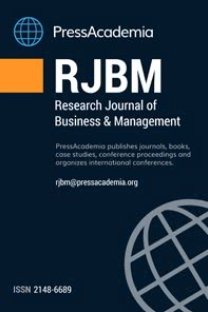Bu çalışma, iş gücü piyasasının potansiyel adayları olan üniversite öğrencilerinin kendilerine ilişkin istihdam edilebilirlik algıları üzerinde etkili olabilecek bazı kişilik özelliklerinden olan hırslı olmak, iç kontrol odaklılık ve yenilikçi kişiliği incelemeyi amaçlamaktadır. Araştırma kapsamında incelenen hipotezleri test etmek icin survey yöntemi ve anket tekniği kullanılmıştır. Bu çalışmanın örneklemini toplam 335 İşletme, Sağlık Bilimleri ve Eğitim Fakültesi öğrencisi oluşturmaktadır. Sosyo-demografik verilerin analizinde, t-test, tek yönlü-ANOVA’dan yararlanılmıştır. Bu çalışmada istihdam edilebilirlik üniversite itibarı, akademik başarı, dış iş gücü piyasasının durumu ve kendine olan inançtan oluşmak üzere dört boyutlu bir üst yapı olarak incelenmiştir.Yapılan hiyerarşik regresyon analizi sonuçlarına göre, hırs ve iç kontrol odaklılık istihdam edilebilirlik üzerinde olumlu yönde etkili iken yenilikçiliğin anlamlı bir etkisinin olmadığı tespit edilmiştir. Yine istihdam edilebilirlik bileşenlerinden biri olan kendi kendine olan inanç diğer boyutlara göre bu değişkenlerden daha fazla etkilenmektedir.1. GİRİŞ
THE EFFECT OF AMBITION, INTERNAL LOCUS OF CONTROL AND INNOVATIVENESS ON SELF-PERCEIVED EMPLOYABILITY
The purpose of this study is to investigate the effect of ambition, internal locus of control and innovativeness on self-perceived employability. In order to test hypothesis, survey method and questionnaire technique were used to apply in this study. The study sample consists of 335 university students of School of Business, Health Sciences Faculty and Education Faculty at Istanbul University. In order to analyze the data, one-way ANOVA, independent T-Test have been conducted to monitor the scores taken from the scales in terms of socio-demographic varieties. This study argues that self-perceived employability represents a second order construct that consists of four dimensions- university brand, the state of the external labour market, the demand for the perceived academic success and general self-belief. According to hierarchical regression analysis results there is a significant effect of ambition and internal locus of control on the self-perceived employability. Also, there is a significant effect of ambition, internal locus of control and innovativeness on general self-belief dimension of perceived employability. Besides it was determined that there is a significant difference between female and male students in terms of perceived self-employability.
___
- Andrews, J.; Higson, H. (2008); Graduate Employability, ‘Soft Skills’ Versus ‘Hard’ Business Knowledge: A
- European Study, Higher Education in Europe, Vol.33, No.4, pp.411-422. Bridgstock, R. (2009), The graduate attributes we’ve overlooked: enhancing graduate employability through career management skills, Higher Education Research & Development, Vol. 28, No. 1, 31–44
- De Vos, A.; De Hauw, S.; Van Der Heijden, B. I. J. M. (2011); Competency development and career success: The mediating role of employability, Journal of Vocational Behavior, 79, 438-447
- Fugate M.; Kinicki, A. J.; Ashforth B. E. (2004); Employability: A psycho-social construct, its dimensions, and applications, Journal of Vocational Behavior, 65, pp. 14–38.
- Fugate, M.; Kinicki, A. J. (2008); A Dispositional Approach To Employability: Development of A Measure and Test of Implications for Employee Reactions to Organizational Change, Journal of Occupational and Organizational Psychology (2008), 81, 503–527
- Kirves, K.; Kinnunen, U.; De Cuyper, N. (2013); Contract Type, Perceived Mobility and Optimism as Antecedents of Perceived Employability, Economic and Industrial Democracy, 0(0) 1–19.
- Knight, p. T.; Yorke, M. (2003); Employability and Good Learning in Higher Education, Teaching in Higher Education, Vol. 8, No. 1, 20-28.
- Lowden, K; Hall S.; Elliot, D.; Lewin J. (2011); Employers’ Perceptions of The Employability Skills of New
- Graduates, Research commissioned by the Edge Foundation, University of Glasgow SCRE Centre and Edge Foundation. Martin, L.; West, J.; Bill, K. (2008); Incorporating Problem-Based Learning Strategies to Develop Learner
- Autonomy and Employability Skills in Sports Science Undergraduates, Journal of Hospitality, Leisure, Sport and Tourism Education, Vol. 7, No. 1. ISSN: 1473-8376
- Mueller, S. L.; Thomas, A. S. (2000); Culture and Entrepreneurial Potential: A Nine Country Study of Locus of
- Control and Innovativeness, Journal of Business Venturing, 16, 51-75. Rotwell, A.; Herbert, I.; Rotwell, F. (2008). Self-Perceived Employability: Construction and Initial Validation of a
- Scale for University Students, Journal of Vocational Behavior, 73, 1-12. Tomlinson, M. (2008); The degree is not enough’: students’ perceptions of the role of higher education credentials for graduate work and employability, British Journal of Sociology of Education, 29:1, 49-61.
- Van Dam, K. (2004); Antecedents and consequences of employability orientation, European Journal Of Work And Organızational Psychology, 2004, 13 (1), 29–51.
- Wittekind, A.; Raeder, S.; Grote, G. (2010); A longitudinal study of determinants of perceived employability,
- Journal of Organizational Behavior. 31, 566–586. Van Der Heijde C. M.; Van Der Heijden, B. I. J. M. (2006); A Competence-Based And Multidimensional
- Operationalization And Measurement Of Employability, Human Resource Management, Fall 2006, Vol. 45, No. 3, 449–476.
- Yayın Aralığı: Yılda 4 Sayı
- Başlangıç: 2014
- Yayıncı: PressAcademia
